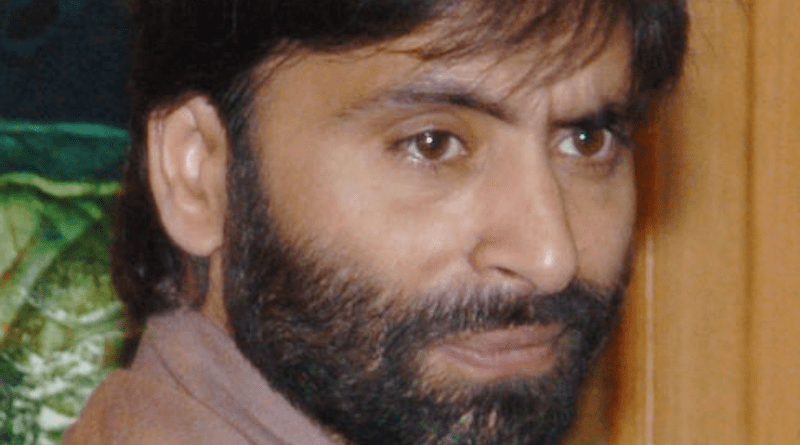Yasin Malik’s Desperate Quest For Relevance – OpEd
Once an icon of the so called ‘armed struggle’ in Kashmir who has had one-on-one meetings with the President of Pakistan and both the prime ministers of India and Pakistan as well as several other world leaders, Jammu and Kashmir Liberation Front [JKLF] chairman Yasin Malik has today been relegated to a political non-entity. So, one can well understand his utter frustration and intense desire to somehow regain relevance in Kashmir politics.
That’s why his latest antic of despatching “a detailed letter to the heads of G20 member states that expressed people’s concern over Indian hidden anti-State agenda in hosting their officials meeting on May 22 and 23 in disputed State of Jammu Kashmir” [sic] comes as no big surprise. That the G20 members have taken no cognisance of the same too doesn’t come as a shocker-simply because Malik has no standing that entitles him to express the “people’s concern” on New Delhi’s decision to host a G20 meeting in Srinagar.
That Malik has always been publicity-hungry is evident from his puerile attempts to grab attention. Readers would recall that during his 2002 interview on BBC HARDtalk with Tim Sebastian, he had laughingly not only admitted but also tried to justify killing four unarmed Indian Air Force officers in Kashmir. In 2013, Malik went all the way to Tamil Nadu to attend a function organised by LTTE sympathisers on the eve of LTTE founder Velupillai Prabhakaran’s death anniversary and supported creation of ‘Tamil Elam’ [independent state for Tamils].
Besides his proclivity for publicity, the JKLF chairman is also a wily opportunist player who knows how to turn a threat into an opportunity. On his release from detention in 1994, Malik made headlines by declaring that he had eschewed violence and that JKLF would henceforth only use peaceful means to pursue its separatist agenda. This path-breaking decision won him accolades, and with many likening him to Mahatma Gandhi, Malik became an international celebrity.
The real reason why Malik chose to end the so called ‘armed struggle’ was less to do with lofty ideals and dictated more by compulsion. It was the Pakistan army’s spy agency Inter-Services Intelligence [ISI] had created JKLF with the sole purpose of waging a proxy war in J&K, and provided it with the necessary wherewithal in terms of weapons, training and funds for this purpose.
However, due to lack of confidence in JKLF, the ISI created Hizbul Mujahideen [HM] and stopped patronising JKLF and with no support forthcoming from ISI, JKLF’s military capability was practically reduced to zero. Facing an existential threat, Malik adroitly presented himself to the world in the new avatar of a peacenik and thereby ensured his relevance in Kashmir’s separatist polity.
However, with the passage of time Malik’s opportunism and duplicity became apparent to the people of Kashmir. While vehemently accusing the security forces for excesses, this self-professed Gandhian and apostle of peace never even cared to condemn atrocities committed by terrorists against the hapless locals. And most shocking was Malik’s stoic silence on the killing of respected separatist leaders by Hizbul Mujahideen terrorists.
In 2011, JKLF organised a seminar on ‘Role of Intellectuals in the Kashmir Movement’ to commemorate the death anniversary of Prof. Abdul Ahad Wani. An academic and JKLF ideologue, Wani was assassinated in 1993 while he was on his way to the university, and the separatist lobby accused security forces and intelligence for this cold blooded murder.
Speaking at this seminar, senior Hurriyat leader Prof Abdul Gani Bhat stunned the audience by revealing that “[Abdul Gani] Lone sahib, Mirwaiz [Mohammad] Farooq, and Professor [Abdul Ahad] Wani were not killed by the Army or the police. They were targeted by our own people. The story is a long one, but we have to tell the truth.” Bhat went on to say “Wherever we found an intellectual, we ended up killing him. Let us ask ourselves: was Prof Wani a martyr of brilliance or a martyr of rivalry?”
While Separatist leader Abdul Gani Lone’s son Sajjad Lone fully endorsed Prof Bhat’s revelation and went on record to condemn the killing of his father and others by terrorists, despite the fact that Prof Wani was a prominent JKLF leader respected for his commitment and integrity, Malik didn’t even utter a single word of condemnation against the murderers of his compatriot. Was this due to fear of retribution from the HM or to stay in the good books of ISI?
In 2013, Malik made yet another attempt to gain ISI’s sympathy by going on a token hunger strike in Islamabad to protest against the execution of Afzal Guru for his role in the 2001 attack on the Indian Parliament that resulted in nine fatalities and left 18 injured. However, instead of being impressed the ISI outwitted him by sending Hafiz Saeed, co-founder of Lashkar-e-Taiba terrorist group to share the dais with the JKLF chairman and left him red-faced.
So, while Malik may not be ready to accept it, the harsh reality is that though he was instrumental in initiating Pakistan’s proxy war in J&K, he ceased to be of any interest to ISI in the early nineties itself. Accordingly, rather than sulk and try to re-launch himself in the avatar of a separatist leader of consequence, the JKLF chief should be grateful to the weak governments at the centre, who tolerated his nonsense for a bit too long.

